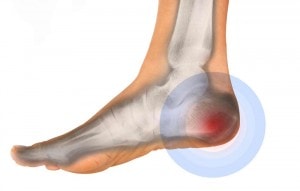“Plantar tendonitis” is the cause of severe foot pain that is sweeping the nation. It’s debilitating millions of Americans, people are complaining about it a lot and it’s interfering with patients’ ability to even stand and walk. It’s keeping even the most athletic among us away from the activities they love most.
So why aren’t most doctors talking about it? A search of “plantar tendonitis” returns fewer results than you might think, and, oddly, there has been no research done on it. But why?
That’s because “plantar tendonitis” doesn’t actually exist. But given how many patients ask about it, we thought we should take the time to set the record straight about this “chronic condition.
Plantar Fasciitis vs. Achilles Tendonitis
It turns out that “plantar tendonitis” is just a mash-up of two completely separate, and very common, chronic foot conditions: plantar fasciitis and Achilles tendonitis.
If you’re one of the thousands of people frantically Googling the condition, don’t be embarrassed! You’re not alone. Many patients that we see in our office conflate the two.
And in fact, they can be related. “A tight Achilles can cause strain on the foot, exacerbating plantar fasciitis,” says Dr. Bob Baravarian. The Achilles fibers continue from the back of the heel to the bottom of the foot, and form the fibers of the plantar fascia. “The two work together to propel forward motion, with the pull transferring from the Achilles to the fascia, to the ball of the foot.”
But, it’s important to understand that they are very different conditions, with their own particular causes and courses of treatment. If you’ve been suffering from chronic foot pain, you need to get an accurate diagnosis in order to finally find relief and regain your mobility.
What is Plantar Fasciitis?
is one of the most common causes of heel pain in adults. It refers to inflammation of the fascia: that’s the thick band of tissue that connects your heel to the ball of your foot, forming the arch. This tissue can become inflamed for many reasons, such as:
Wearing shoes with inadequate arch support.
- Excess bodyweight or sudden weight gain (including pregnancy), putting downward pressure on the arch.
- Running long distances.
- Having abnormally flat feet or high arches.
- Tightening in the Achilles tendon
What really characterizes this sharp, stabbing pain from other forms of foot pain is the onset timing. Plantar fasciitis pain is worst in the morning, or after long periods of sitting. As the tissue loosens up, the pain tends to subside.
What is Achilles Tendonitis?
refers to deterioration of the Achilles tendon, due to overuse. The Achilles tendon is the tendon that connects the calf to the heel bone. According to some estimates, Achilles tendonitis ends up accounting for about 11% of running injuries.
What are some signs and symptoms of Achilles tendonitis?
- Foot pain
- Limited range of motion
- Swelling
- Feeling of weakness in the calf and ankle
Although Achilles tendonitis may have a genetic component, and are more common among older, male, and obese individuals, the condition is most closely related to repeated stress and overuse. Achilles tendonitis can also increase your risk of Achilles rupture, which is why it’s important to get treatment right away as soon as you notice something is wrong.
Preventing Foot Pain
Each condition may have its own treatments, but fortunately you can prevent both with similar tactics. Incorporate these habits into your daily routine, and with a little luck, you can stay active and pain-free.
- Warm up before exercising. Allow your muscles to loosen up before you put too much strain on them.
- Perform stretches. Stretch your calf by placing your hands on a wall, keeping one knee bent and foot forward, and the other knee straight, with the heel to the ground. You can also roll the bottom of your foot on a lacrosse ball, frozen water bottle, or foam roller.
- Avoid walking in bare feet or flip-flops. Your arches need support if they’re to last you a lifetime.
- Wear appropriate footwear for the shape of your foot. Flat feet? High arches? If you’re unsure which shoes are right for you, contact your foot and ankle specialist. You can also get fitted for a custom set of insoles to fit your unique feet.
The physicians at University Foot and Ankle Institute have decades of combined experience effectively treating Achilles tendonitis and plantar fasciitis. We are leaders in the field of research and treatment of all foot and ankle conditions.
If you would like more information or to schedule a consultation, please call (877) 736-6001 or visit us at www.footankleinstitute.com.
- Avoiding Foot and Ankle Overuse Injuries While Dog Walking - July 17, 2023
- What is Floating Toe Syndrome? - June 12, 2023
- Is there a link between gout and heart disease? Studies Say Yes - February 22, 2022

 Wearing shoes with inadequate arch support.
Wearing shoes with inadequate arch support.
Can an altered gait, due to a history of knee and or ankle injury, cause one to develop ” Plantar Fasciitis?
Yes, for sure.